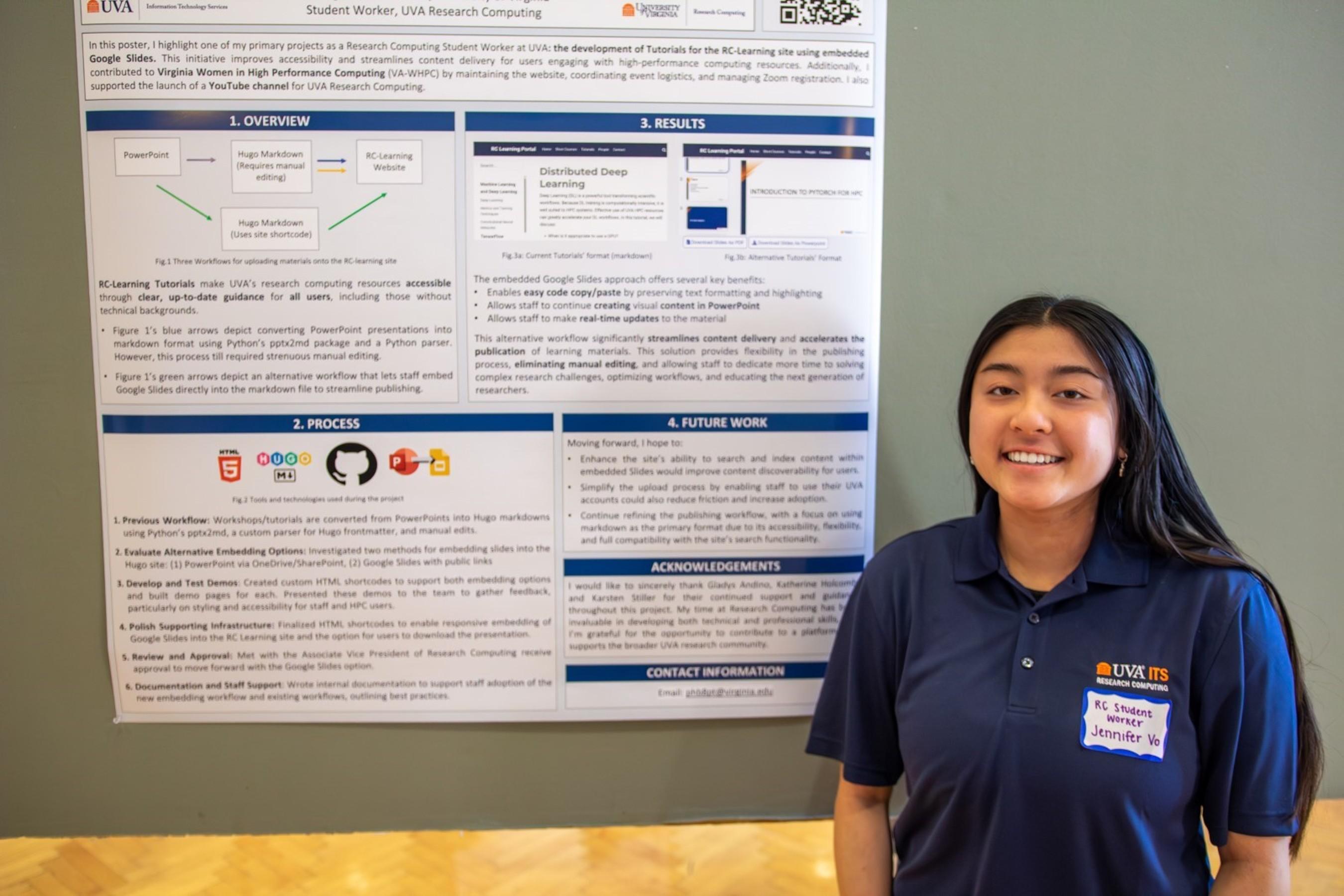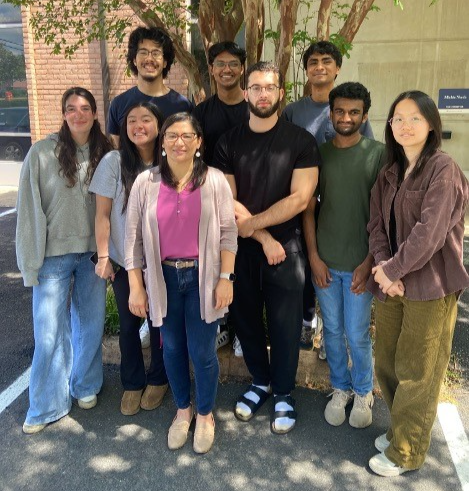
As a student worker at UVA Research Computing, Jennifer Vo blended technical development with community outreach. She enhanced the Research Computing Learning site, streamlined internal workflows, and represented the team at national workshops. In this Q&A, she reflects on how hands-on projects, mentorship, and cross-disciplinary collaboration helped her grow as both a developer and communicator. That growth played a direct role in helping her secure a full-time position after graduation.
Jennifer Vo
Major: Computer Science in the Engineering School
Minor: Data Science
Relevant Interests & Previous Experience:
At UVA, I worked as a Teaching Assistant (TA) for a few CS classes including Computer Game Design and Software Development Essentials. During this past school year, I balanced my work at Research Computing with serving as a TA for Computer Game Design. Additionally, I’m a huge fan of puzzles, which translates well into the logical thinking required in both high-performance computing (HPC) and software development.
What sparked your interest in working with UVA Research Computing?
I was looking for an opportunity to gain hands-on technical and professional experience in a collaborative setting. After taking courses in Artificial Intelligence and Machine Learning, both of which rely on HPC for model training, I became curious about the infrastructure behind the scenes. UVA Research Computing stood out as a place where I could engage with coding, visualization, and diverse interdisciplinary teams. The chance to work with professionals from different domains helped me explore various interests while identifying the environments and tasks I thrive in.
What kinds of responsibilities and opportunities did you have as a student worker?

I mostly worked on and led projects. My primary project involved contributing to the development and organization of instructional content on the Research Computing Learning site. I worked closely with staff to design a more efficient workflow for uploading and maintaining workshop materials. Beyond technical tasks, I had several leadership and outreach opportunities, such as representing this student program at the Coalition for Academic Scientific Computation Spring 2025 Member Meeting and Cyberinfrastructure Leadership Academy Workshop, where I spoke on a panel. I also collaborated with the Virginia Women in High Performance Computing committee to host virtual events that showcased career paths and trends in research computing, helping connect HPC professionals across Virginia institutions.
What are some of the most important skills you developed or lessons you learned during your work at Research Computing?
This role helped me develop both technical confidence and professional maturity. While I gained practical familiarity with HPC systems and tools, the most transformative skills were in communication and teamwork. I learned how to engage with experts from a wide range of disciplines, adjust my communication style based on the audience, and manage independent tasks proactively. I became more comfortable taking initiative, navigating ambiguity, and balancing technical execution with clear documentation and knowledge-sharing.
Can you share a project or accomplishment from your time as a student worker that you’re especially proud of?
One accomplishment I’m especially proud of is the comprehensive documentation I created for Research Computing’s internal wiki. After working extensively on the Research Computing Learning website, I developed a detailed, step-by-step guide for uploading workshop materials from various starting points, such as PowerPoint. This resource captures best practices and helps ensure consistency in the workflow. The Research Computing team has mentioned that it’s been a valuable reference when creating and posting new materials, which makes me proud to know that my work continues to support the team even after my internship.
I hope the documentation and workflows I developed will continue to support consistency and efficiency on the Learning website. By streamlining the process for uploading and accessing high-quality training materials, I aimed to enhance the overall learning experience for UVA researchers, instructors, and students engaging with HPC resources. I also wanted to support the staff by reducing repetitive tasks and helping bridge the gap between HPC staff and users. By improving accessibility, I hope my work will make HPC resources more approachable and useful for the broader UVA research community.
How did the UVA Research Computing team support your growth and learning throughout your time there?

The UVA Research Computing team was incredibly supportive and generous with their time and expertise. From day one, I was encouraged to ask questions, take ownership of my projects, and share ideas — regardless of my student status. Their mentorship helped me build confidence in professional settings and taught me how to communicate effectively across technical and non-technical audiences. One particularly meaningful moment was presenting my work to multiple stakeholders, including senior leadership. It was both a challenge and a privilege, and I’m incredibly grateful for the trust and support that made experiences like that possible. I always felt like a valued team member, not just a temporary intern.
How has this experience helped prepare you for your future academic or professional goals?
This internship gave me a foundation in technical leadership. It’s one thing to contribute to a project, but it’s another to lead one from beginning to end. I had the chance to own a full workflow, understand the technical and organizational components, and explain it to different audiences. These experiences were invaluable as I prepared for job interviews, and they played a direct role in securing a full-time role after graduation.
What advice would you give to other students who are interested in research computing?
Be curious and take initiative. HPC might seem intimidating at first, but you don’t need to be an expert to contribute meaningfully. Ask questions, seek feedback, and look for ways to improve existing systems. Communication and collaboration are just as important as technical skills, often more so when working with interdisciplinary teams. And don’t be afraid to document your work or volunteer to present it. Research computing is a field where students can truly have an impact, especially if they’re willing to step up, learn, and lead.
Are you a student interested in research computing?
See how to join the Student Worker Program >